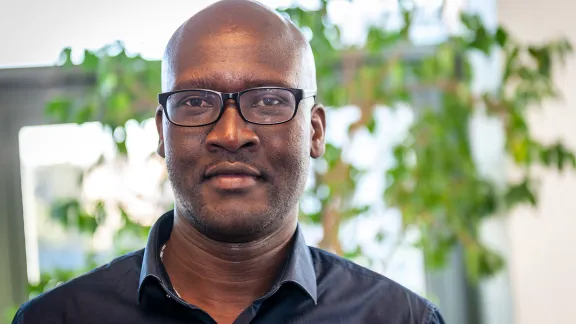
Isaiah Toroitich, Head of Global Advocacy leads the LWF Action for Justice that is the focal point for advocacy on Human Rights. Photo: LWF/S. Gallay
"Our call is to ensure that the human rights of everyone is fulfilled” says Isaiah Toroitich, LWF Head of Global Advocacy
(LWI) - Every year on December 10 the world celebrates Human Rights Day. Working for a justice is a foundational calling the Lutheran World Federation (LWF) has committed to respond to. Isaiah Toroitich, LWF’s Head of Global Advocacy leads the advocacy unit, called Action for Justice unit. In this interview he reflects on the unique role of the LWF in human rights advocacy.
Has advocacy always been a part of the LWF’s work?
When LWF was formed in 1947, one of its main purposes was to respond to human suffering. I would say that is when LWF’s advocacy began. It started with an understanding that human suffering can be alleviated through service, by helping those who are in need, and by addressing the root causes of their suffering. That is where advocacy comes in. Over the years LWF’s advocacy has developed particularly in the context of framing it into the human rights-based approach and a rooting it in Lutheran theology. Today, our advocacy work, links our faith identity and human rights and mobilizes churches from all across the world to raise their prophetic voice and engage with decision-makers at all levels.
The unit that leads the work is called Action for Justice (AFJ), where does the name come from?
The two operative words here are “action” and “justice”. This name comes from the understanding that advocacy should be action oriented. It's about people doing something for a purpose. This purpose is justice and dignity for all. The Action for Justice unit was established as the advocacy hub of the LWF. Its main purpose is to coordinate, support and link the advocacy work of the LWF member churches and of the country programs in LWF World Service. This is done from the local level and brought up to the global arena where major policies and decisions are made. A key way to look at AFJ is to think about advocacy not as just words and theories, but also involving people doing something in order to make change. The more we have grown in our advocacy in the LWF the more we have understood that the rights holders and communities we are serving have the agency, power and ability to act for their own justice. What we do is support and accompany them.
Can you explain the LWF’s approach to advocacy?
The LWF has a three-pronged approach to advocacy. The first one is the rights-based approach, where we work with people, the rights holders, to enable them to claim their own human rights from those responsible, we call them duty bearers.
Secondly, our advocacy is faith inspired and grounded in theology. We apply our faith values and identity. In a sense we look at people from a Lutheran theological perspective as bearers of the image of God and having a God-given dignity. Therefore, when we do advocacy with them or in some cases on their behalf, their dignity comes to the forefront. We understand advocacy as part of our holistic mission and our calling. We approach it with deep humility and with the understanding that we are part of a larger body contributing and serving together for peace, justice and reconciliation.
The last approach we use is a local to global to local methodology. Our advocacy begins at the local level where people live, where people’s livelihoods are. It is then taken up to the national level, regional level and global level where policies and decisions are taken. The advocacy work doesn’t end there for it must go back to the local level where the people are. It necessarily means that people and communities are at the center of advocacy and therefore their empowerment is crucial. This approach is particularly instrumental for LWF because a great majority of our work is done at the local level by our member churches in nearly 100 countries. In addition, our World Service country programs are operational on the ground. This makes our advocacy relevant and offers a solid foundation for credibility.
Why is it important for the church to uphold and defend human rights?
In the recent years there has been a strong pushback against human rights. We see and hear this from our churches, our communities and our partners in all regions of the world. It is becoming more and more difficult for people to enjoy their human rights because of conflicts, humanitarian crises, oppressive regimes, and unjust policies and practices.
For this reason, we believe that churches have a particularly unique role both to directly support people that are affected by human rights violations and in advocating for and claiming human rights as part of their narrative and mandate in their work and service to the world.
We believe churches have a unique role to directly support people affected by human rights violations and in advocating for and claiming human rights as part of their narrative and mandate in their work and service to the world.
We also believe that churches have a unique understanding and appreciation of human rights. In many cases, churches have a particular influence in terms of their reach towards the communities they are part of and serve. They also have access to decision makers, some of whom are members of their congregations. As a result, churches have the potential to transform and change lives because of their advocacy for the protection and promotion of human rights and justice. Recently, we have seen that a number of churches are themselves facing human rights violations. The space to practice their faith and to serve communities has been restricted by authoritarian regimes. We believe that by working together on human rights, we help to expand the ability of churches and other actors to continue in their service towards communities.
10 December is the Human Rights Day, marking the day the United Nations General Assembly adopted the Universal Declaration of Human Rights – what does this day mean to you?
This day in 1948 was one of the most significant dates in the lives of people and communities worldwide. This is when human rights were recognized and the affirmation that that everyone had a human right was made. While it is important to celebrate this day, we in the LWF are aware that it is also, a sad day because there are still millions of people in the world whose human rights are not protected or fulfilled. For this reason, on this day, we are reminded to redouble our efforts towards action for justice and human rights for all – especially the marginalized.
LWF/T. Rakoto


